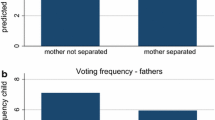Abstract
Longitudinal data from the British National Child Development Study were used to examine the relationship between parental background in childhood and left-right beliefs and political cynicism-trust in adulthood (age 33). Parental backgrounds were separated into those relating to the structure (birth, step, single) and those relating to the socio-economic context (severe socio-economic disadvantage, experience of public care) of the family. Growing up with a widowed or a single parent had no effect in later political attitudes, and neither the structure nor the context of the parental background were related to left-right beliefs in men. An experience of public care predicted political cynicism in those who grew up in stepfamilies, and an experience of socio-economic disadvantage predicted left-wing beliefs in women.
Similar content being viewed by others
References
Alex-Assensoh, Y., & Assensoh, A. B. (2001). Inner-city contexts, church attendance, and African-American political participation. Journal of Politics, 63, 886-901.
Bebbington, A., & Miles, J. (1989). The background of children who enter local authority care. British Journal of Social Work, 19, 349-368.
Bradshaw, J. (1990). Child poverty and deprivation in the UK. London: National Children's Bureau.
Bynner, J., & Ashford, S. (1994). Politics and participation: Some antecedents of young people's attitudes to the political system and political activity. European Journal of Social Psychology, 24, 223-236.
Cheung, S. Y., & Buchanan, A. (1997). Malaise scores in adulthood of children and young people who have been in care. Journal of Child Psychology and Psychiatry, 38, 575-580.
Dalhouse, M., & Frideres, J. S. (1996). Intergenerational congruence: The role of the family in political attitudes of youth. Journal of Family Issues, 17, 227-248.
Dolan, K. (1995). Attitudes, behaviors, and the influence of the family: A reexamination of the role of family structure. Political Behavior, 17, 251-264.
Evans, G., Heath, A., & Lalljee, M. (1996). Measuring left-right and libertarian-authoritarian values in the British electorate. British Journal of Sociology, 47, 93-112.
Glass, J., Bengtson, V. L., & Dunham, C. C. (1986). Attitude similarity in three-generation families: Socialization, status inheritance, or reciprocal influence? American Sociological Review, 51, 685-698.
Hair, J. F., Jr., Anderson, R. E., Tatham, R. L., & Black, W. C. (1995). Multivariate data analysis with readings. Upper Saddle River, NJ: Prentice-Hall.
Inglehart, R. (1990). Culture shift in advanced industrial society. Princeton: Princeton University Press.
Kamano, S. (1999). Comparing individual attitudes in seven countries. Social Science Research, 28, 1-35.
Marsh, A. (1990). Political action in Europe and the USA. London: Macmillan.
Marshall, G. (1994). The concise Oxford dictionary of sociology. Oxford: Oxford University Press.
Nieuwbeerta, P., & Wittebrood, K. (1995). Intergenerational transmission of political party preference in the Netherlands. Social Science Research, 24, 243-261.
Peterson, B. E., & Duncan, L. E. (1999). Authoritarianism of parents and offspring: Intergenerational politics and adjustment to college. Journal of Research in Personality, 33, 494-513.
Shepherd, P. (1993). Appendix I: Analysis of response bias. In E. Ferri (Ed.), Life at 33: The fifth follow-up of the National Child Development Study (pp. 184-188). London: National Children's Bureau.
Smith, T. W. (1997). Factors relating to misanthropy in contemporary American society. Social Science Research, 26, 170-196.
Westholm, A. (1999). The perceptual pathway: Tracing the mechanisms of political value transfer across generations. Political Psychology, 20, 525-551.
Wiggins, R. D., & Bynner, J. (1993). Social attitudes. In E. Ferri (Ed.), Life at 33: The fifth follow-up of the National Child Development Study (pp. 162-183). London: National Children's Bureau.
Author information
Authors and Affiliations
Rights and permissions
About this article
Cite this article
Flouri, E. Parental Background and Political Attitudes in British Adults. Journal of Family and Economic Issues 25, 245–254 (2004). https://doi.org/10.1023/B:JEEI.0000023640.19330.70
Issue Date:
DOI: https://doi.org/10.1023/B:JEEI.0000023640.19330.70



